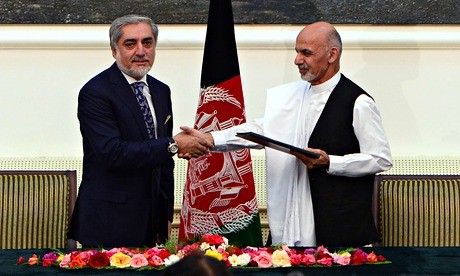(VOVworld) – Newly-elected Afghan President Ashraf Ghani was sworn into office on September 29, ending the term of President Hamid Karzai since the Taliban regime collapsed in 2001. President Ashraf Ghani’s taking office was the first democratic transition of power in Afghanistan in more than a decade. Ghani has appointed a chief executive officer of the government - a role similar to that of Prime Minister.
 |
Afghan presidential candidates Abdullah Abdullah and Ashraf Ghani Ahmadzai shake hands after signing a power-sharing agreement at the Presidential Palace in Kabul
Photograph: Wakil Kohsar/AFP/Getty Images |
Ashraf Ghani was sworn into office after he and Abdullah Abdullah, the runner-up in the presidential election, reached a power-sharing deal in which Mr. Abdullah will take the post of Chief Executive Officer of the Government.
Internal differences are big obstacles
The Afghan people and the international community hope the two leaders will build a national unity government that can ensure peace, stability, and prosperity. But analysts say big challenges to the new government are evident. It won’t be easy to manage a coalition of two opposing factions. Abdullah is supported by the Tajiks, the second biggest ethnic group in Afghanistan, and a few other ethnic groups in the north. Ghani is backed by the Pashtun living in the east and south. It will be difficult for the two forces to cooperate in a coalition government.
The power-sharing deal resulted from pressure from the UN and the international community, not from the desires and interests of the two parties in the coalition. But observers say the power-sharing deal is necessary to deliver Afghanistan from its prolonged political crisis, because a dispute over the election would harm any possible progress.
Ensuring security, restoring the economy
In addition to settling internal affairs, the new Afghan government will have to deal with security and economic issues. Prior to the President’s swearing-in ceremony, a suicide bomb exploded in Kabul targeting a security checkpoint near the airport. The Taliban claimed responsibility for the attack on Twitter. The fight against the Taliban is certainly a primary task of the new government. The attack shows that the war against the Taliban over the past decade is far from over.
After the swearing-in ceremony, President Ghani called on the Taliban to rejoin peace talks after the 13-year civil war. He is scheduled to sign a security agreement with the US on September 30, a deal that former President Karzai refused to sign. The agreement will allow more than 10,000 soldiers of the US-led coalition forces to remain in Afghanistan to train and assist the new Afghan army and police. The signing of the agreement is a double-edged sword because when the Taliban insists on a complete absence of US forces in Afghanistan after 2014.
President Ghani is expected to sign a NATO Status of Forces Agreement which will allow about 20,000 forces of NATO countries to stay in Afghanistan.
Political strike, violence, and lack of reform have threatened Afghanistan’s economic growth. The International Monetary Fund estimates that Afghanistan’s GDP growth will shrink to 3.2% this year from 3.6% last year. The new government is so broke it cannot pay its civil servants’ salaries for October. Whether the new coalition government can turn Afghanistan around remains to be seen.